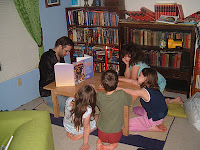Son, on how he can have babies~ Age 7
"Okay, I'm half you and half dad. And when an adult male sexes with an adult female, then the baby's half me and half her."
 |
| Crafting the perfect pregnant woman shell for her brother |
To understand what my children are thinking and feeling, as completely different people than I, I can only compare what they’re experiencing to my own childhood and try to analyze whether I think my own experience on such subject created positive, or negative, responses to this day in myself. But in this method there is a flaw, which is that in parenting reactively to my own upbringing–and trying to be the opposite on issues that I feel affected my own upbringing negatively–I still don't address what made me grow up inclined to be the "opposite" of what my parents wanted for me.
The quandary comes into play in trying to find the balance between raising a daughter who knows without a doubt her own worth–by reiterating this point in as many ways possible–and raising a daughter who then sets out to be as different from you as she can. What’s making the point, and then what’s belaboring the point? When I think back, I realize most of my unconscious social construction was taught by example, rather than words, while the conscious construction is always under construction, thank you very much.
Words are dismissible. Learned behavior is much, much harder to shed.
“Did I put too much love in that hug?”
Son, after finally releasing me from a long hug that included hanging on me and sound-effects ~ Age 7
 |
| Johnny is dungeon master for the kids and their cousins |
I despair sometimes, thinking about how partially effective I may be: does that mean my daughter will only partially believe in her own worth, and should she succeed in instilling in her daughter a little more self-worth than she has, then can I expect to have a great-granddaughter or two who truly believe in their own inherent self-worth? I want to succeed in this so badly: the thought of my own daughter struggling as I do infuriates me. Because I believe it would be a personal failure should I not be a true reflection of her awesome little self. When she looks in my eyes, I want her to see complete belief and acceptance, and I fear that with all the personal issues I struggle with, that what she sees reflected is instead my own doubt.
Example is damned hard to fake.
John, amused: “Get some pants or shorts on, boy.”
Son: “Why?”
John: “Well, you don’t have to if you don’t want to.”
Son, in complete seriousness: “I like my body.” ~ Age 6
 |
| Son rather impatiently suffering to be dressed as a girl by his sister. The topknot really didn't impress him. |
All I can do is challenge his assumptions, and encourage him to actually think about what he’s saying, and attempt to justify it. Can he, or is he just aping something he’s seen? Between John and my needling that he not accept everything he hears blindly but that he must be able to identify justification, and John's atypical social example as a man who stays home with the children while I work outside the home, we hope to see him and his sister develop into people who thinks for themselves.

No comments:
Post a Comment